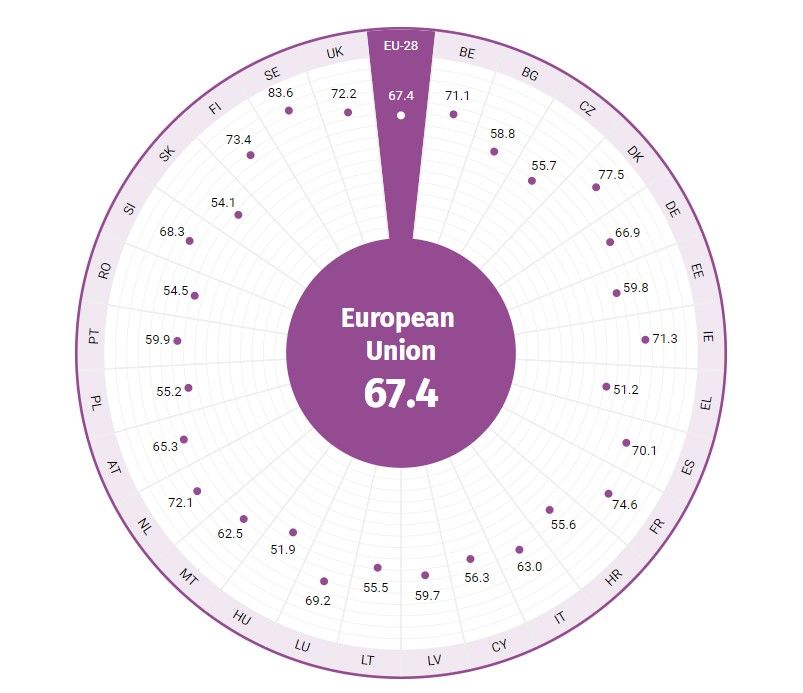
Work-life imbalance remains one of the biggest obstacles for gender equality in Europe
The new Gender Equality Index focuses on work-life balance. The report shows that family responsibilities are more of a barrier for women’s social progress than for men. This is not just about childcare responsibilities, as rising disability rates and aging populations in the EU create more demand for long-term care. ETUCE calls for education that breaks down gender stereotypes around family care and educational choices, and better funding for flexible education options that let women access lifelong learning. The education sector itself must also ensure a decent work-life balance that gives women workers space to succeed.
The new Gender Equality Index focuses on work-life balance. The report shows that family responsibilities are more of a barrier for women’s social progress than for men. This is not just about childcare responsibilities, as rising disability rates and aging populations in the EU create more demand for long-term care. ETUCE calls for education that breaks down gender stereotypes around family care and educational choices, and better funding for flexible education options that let women access lifelong learning. The education sector itself must also ensure a decent work-life balance that gives women workers space to succeed.
Since 2014 the European Institute for Gender Equality (EIGE) releases its Gender Equality Index every two years. The Index presents and analyses the latest data on progress towards gender equality in the European Union in the fields of work, health, money, knowledge, time and power. This year’s edition was released on 15 October.

The results once again show that gender equality is far from complete. With an EU average of 67.4 out of a possible 100 points, the Gender Equality Index presents an improvement of merely 1.2 points between 2015 and 2017 and an overall progress of 5.4 points in the 12 years since 2005. Even though some countries like Portugal (+3.9), Estonia (+3.1), Croatia (+2.5), improved their scores significantly, other countries are stalling or even regressing, like Poland (-1.6), Lithuania (-1) and the Netherlands (-0.8). With 83.6 points Sweden is leading by a wide margin. Greece (51.2) and Hungary (51.9) are coming last. For the first time, the Index also highlights the situation of LGBTQI+ people and Roma and Muslim women in areas where statistics are available.
What are the reasons for the slowing progress towards gender equality across Europe? The report sees gender segregation, gender norms and the difficulties in achieving work-life balance as the main challenges. Challenges with parental leave, flexible working arrangements and care responsibilities are complicating the struggle for gender equality. Across the EU, women are still the ones mostly responsible for the care of children, the elderly and people with disabilities, with repercussions on their careers and pensions. Moreover, the length of parental leave in the EU varies drastically between 4.2 months in some member states, to more than 3 years in others. However, on average 34% of women and 23% of men (age 24-49) in the EU are ineligible for parental leave because of their employment, education or family situation.
The report shows the lack of progress in terms of gender segregation in education. 43% of women still study humanities or health-related subjects, as opposed to just 23% of men. The same stagnation can be observed in the data on lifelong learning, where women’s participation remains weak. Once again, the report sees the lack of time due to work and family duties as the main barrier to women who would otherwise want to access education.
Susan Flocken, European Director of ETUCE, voiced her concern:“This report shows that Europe must take urgent action to improve work-life balance if we want real gender equality. The education sector has a key role to play, both in breaking down gender stereotypes around childcare and family responsibilities, and in making sure lifelong learning is a realistic possibility for everyone. This means adequate funding for accessible education options throughout life. The education professions themselves must also guarantee a decent work-life balance and equal access to career-enhancing training and professional development for women and men. This is the only way to solve the paradox of women’s underrepresentation in leadership positions within the majority female education sector.”